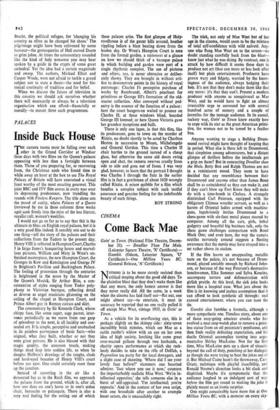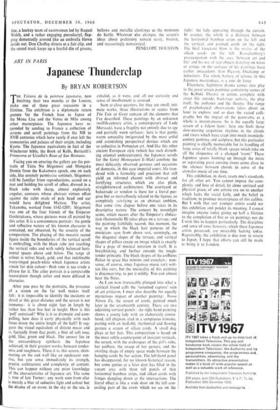CINEMA
Come Back Mae
Goin' to Town. (National Film Theatre, Decem- ber 31). — Deadlier Than The Male. (Leicester Square Theatre, `X' Certificate).— Gambit. (Odeon, Leicester Square, 'V' Certificate.)—One Million Years BC. (General Release, `A' Certificate.) NOTHING is to be more sternly resisted than critical moping about the good old days. To the plaintive bleat that they don't make them like that any more, the only honest answer is that they never really did. All the same, in a week when the cinema has laid itself out—flat out, one might almost say—to entertain, it must in accuracy be reported that no one really pulled it off except Mae West, vintage 1935, in Goin' to Town.
As a vehicle for its overflowing star, this is perhaps slightly on the skimpy side : sixty-seven incredibly brisk minutes, which see Mae as a cattle rustler's widow with an eye on her own idea of high society, lurching like some great over-masted galleon through two husbands, a charity opera performance at which she reck- lessly decides to take on the role of Delilah, a Pygmalion tea party for the local dowagers, and a slight case of shooting. 'Where did I see your lovely face before?' stammers one besotted admirer. `Just where you- see it now,' counters the imperturbably realistic Miss West. 'We're in- tellectual opposites,' she tells someone else in a burst of self-appraisal. 'I'm intellectual; you're opposite.' And in the context of her own script, with one broadside after another to crumple lesser actors, she is unassailably right. The trick, not only of Mae West but of her age in the cinema, would seem to be the mixture of total self-confidence with wild naivete. Any- one who flung Mae West on to the screen—no doubt standing carefully back from the blast— knew just what he was doing. By contrast, one is struck by how difficult it seems these days to produce not art (that can more or less look after itself) but plain entertainment. Producers have grown wary and fidgety, worried by the know- ingness of the audience, always hedging their bets. It's not that they don't make them like that any more: it's that they can't. Present a modern producer with anyone as unequivocal as Mae West, and he would have to fight an almost irresistible urge to surround her with several hundred acres of scenery and a couple of juveniles for the teenage audience. In its casual, rackety way, Goin' to Town knew exactly how to cope with its star as the great American primi- tive, the woman not to be tamed by a feather boa.
Anyone wanting to stage a Bulldog Drum- mond revival might have thought of keeping that in period. What else is there left to Drummond, that simpleton among adventurers, but a distant glimpse of thrillers before the intellectuals got a grip on them? But in concocting Deadlier than the Male, Betty Box and Ralph Thomas are not in a reminiscent mood. They seem to have decided that any resemblance between their Drummond and anyone other than James Bond shall be as coincidental as they can make it, and if they can't blow up Fort Knox they will make do with a time-bomb in Chelsea. A strangely diminished Carl Petersen, equipped with the obligatory Chinese wrestler servant, as well as a harem of Oriental ladies armed with machine- guns, lugubriously invites Drummond to a chess-game with six-foot metal pieces steered by computer. Among all the cars, girls, lethal gadgetry and boastful big business talk, only the chess game challenges comparison with Bond Mark One; and even here, the way the camera scuttles nervously around suggests a fleeting awareness that the movie may have strayed into a set rather above its station.
If the film leaves an unappealing, metallic taste on the palate, it's not because of Drum- mond, played amiably enough by Richard John- son, or because of the way Petersen's destructive henchwomen, Elke Sommer and Sylva Koscina, accompany torture and defenestration with girlish prattle. At this level, the sick joke looks more like a hospital case. What jars about the film is its knowing and joyless assumption that it can afford to look synthetic all through: real canned entertainment, where you can taste the tin.
Gambit also fumbles a formula, although a more sympathetic one. Timeless story, about one of those easy-going amateur crooks who has evolved a neat stop-watch plan to remove a price- less statue from an oil potentate's penthouse, and then finds reality defeating expectation, and his docile Oriental accomplice turning into argu- mentative Shirley MacLaine. Not for the first time, Miss MacLaine puts up a show of vivacity beyond the call of duty, punching at her dialogue as though she were trying to beat the jokes out of it. But Michael Caine hasn't the throwaway, Cary Grant, technique with playful irascibility, and Ronald Neame's direction looks a bit slack and dispirited. Maybe it's symptomatic that the audience laughed in an indulgent sort of way before the film got round to making the joke it plainly meant as an ironic surprise. One might conceivably have more fun at One Million Years BC, with a monster on every sky-
line, a hockey team of cavewomen led by Raquel Welch, and a rather engaging pterodactyl, flap- ping dementedly around like an umbrella blown inside out. Don Chaffey directs at a fair clip, and the sound track keeps up a fearful din of groans, bellows and metallic clankings as the monsters do battle. Whatever else changes, the screen's ideas about prehistory remain nasty, brutish, and reassuringly nonsensical.
PENELOPE HOUSTON







































 Previous page
Previous page